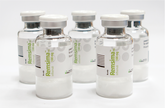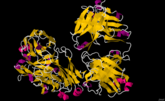Biosimilars
FDA approves biosimilar infliximab Renflexis
Samsung Bioepis announced on 24 April 2017 that the US Food and Drug Administration (FDA) had approved its biosimilar version of Johnson & Johnson and Merck’s Remicade (infliximab).
EMA approval for etanercept and rituximab biosimilars
The European Medicines Agency’s (EMA) Committee for Medicinal Products for Human Use (CHMP) announced on 21 April 2017 that it had recommended granting marketing authorization for the etanercept biosimilar Erelzi and for the rituximab biosimilars Rixathon and Riximyo.
Prospective study finds switching to biosimilar infliximab safe
A study of the infliximab biosimilar Remsima has, according to the authors, shown similar ‘safety and survival’ of biosimilar infliximab Remsima compared to the originator biological Remicade [1].
Fujifilm ramps up biosimilars production as UK court allows Humira biosimilar
A UK court has ruled in the favour of Japan-based Fujifilm Kyowa Kirin Biologics’ Humira biosimilar. The Fujifilm corporation has also announced a multi-million-dollar investment in its biologicals production facilities in the US.
Rituximab biosimilar safe in advanced follicular lymphoma patients
A study of the rituximab biosimilar CT‑P10 has, according to the authors, ‘demonstrated’ similar pharmacokinetics (PK) and safety when administered in combination with cyclophosphamide, vincristine and prednisone (CVP) in patients with newly diagnosed advanced follicular lymphoma (AFL) [1].
Advances in ranibizumab and teriparatide biosimilars
Positive results have been reported from a ranibizumab biosimilar and a teriparatide biosimilar has entered phase III trials.
Biosimilars of certolizumab pegol
Certolizumab pegol is a monoclonal antibody directed against tumour necrosis factor-alfa (TNF-α). More precisely, it is a PEGylated Fab’ fragment of a humanized TNF inhibitor monoclonal antibody. It is indicated for the treatment of Crohn’s disease, rheumatoid arthritis, psoriatic arthritis and ankylosing spondylitis.
Harmonization of requirements for NBCDs across regions
Efforts are being undertaken to continuously develop and harmonize the regulatory requirements for complex medicinal products across regions. Taking this into account, authors Ehmann and Pita believe the European Union (EU) network is ready for non-biological complex drugs (NBCDs) [1].
US pharmacists’ views on the naming and labelling of biologicals
The Alliance for Safe Biologic Medicines (ASBM) has published the results of a survey determining the opinions of US pharmacists about the naming and labelling of biosimilars [1].
Trastuzumab biosimilar submitted for approval in Japan
Japan-based Nippon Kayaku announced on 11 April 2017 that it had submitted an application for its trastuzumab biosimilar, CT-P6, to the Ministry of Health, Labour and Welfare (MHLW) in Japan.













